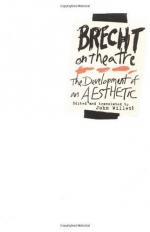
|
| Name: _________________________ | Period: ___________________ |
This test consists of 15 multiple choice questions and 5 short answer questions.
Multiple Choice Questions
1. In Life of Galileo, Richard Gloster courts _____.
(a) His cousin.
(b) His victim's widow.
(c) His sister's best friend.
(d) His teacher.
2. Who puts himself at the Philosopher's disposal in Der Messingkauf?
(a) The Actor.
(b) The Electrician.
(c) The Dramaturg.
(d) The Actress.
3. Brecht states that art is no Land of _____.
(a) Milk and Honey.
(b) Love.
(c) The Lost.
(d) Cockaigne.
4. In Neher's Antigone, what sits on four posts as part of the setting?
(a) Rocks.
(b) Pots.
(c) Horse skulls.
(d) Human skulls.
5. What nationality of horsemen are depicted in Christ Carrying the Cross?
(a) Spanish.
(b) Flemish.
(c) Turkish.
(d) Moorish.
6. Where did Brecht address the all-German cultural congress?
(a) Bohn.
(b) Frankfurt.
(c) Leipzig.
(d) Cornwall.
7. The expressionism of the postwar period showed the World as Will and Idea and led to a special kind of _____.
(a) Solopsism.
(b) Caricature.
(c) Monopolism.
(d) Regression.
8. Why was Antigone picked up for production?
(a) Its sets.
(b) Its sense of drama.
(c) Its characterization.
(d) Its timely subject matter.
9. Where in Laughton's house did he and Brecht work in the morning?
(a) The dining room.
(b) The living room.
(c) The library.
(d) The kitchen.
10. _____ with a character should be treated as just another method of observation in rehearsals.
(a) Tragedy.
(b) Drama.
(c) Empathy.
(d) Extremism.
11. The stylization by which an actor's performance becomes art must not destroy _____ in the process.
(a) Naturalness.
(b) The plot.
(c) The setting.
(d) Bleakness.
12. Brecht states that it is not the job of the Marxist-Leninist party to organize production of poetry as on a _____.
(a) Tomato farm.
(b) Factory floor.
(c) Poultry farm.
(d) Ford assembly line.
13. _____temperament in epic theatre is discouraged.
(a) Obtrusive.
(b) Docile.
(c) Angry.
(d) Indulgent.
14. Who spoke in 1826 of the inadequacy of the English wooden stage of Shakespeare's day?
(a) Shelley.
(b) Kessler.
(c) Goethe.
(d) Pound.
15. Where did Helene Weigel give acting lessons at theatre school, possibly using Brecht's list of exercises?
(a) Scotland.
(b) Moscow.
(c) Paris.
(d) Finland.
Short Answer Questions
1. Brecht's first book of poems contained songs and _____.
2. Brecht calls realistic acting _____ acting.
3. Brecht believed that the social realism in Germany must also be _____ realism.
4. Length of scene was settled during _____.
5. Woyzeck buys a _____ in order to do his wife in.
|
This section contains 345 words (approx. 2 pages at 300 words per page) |

|




